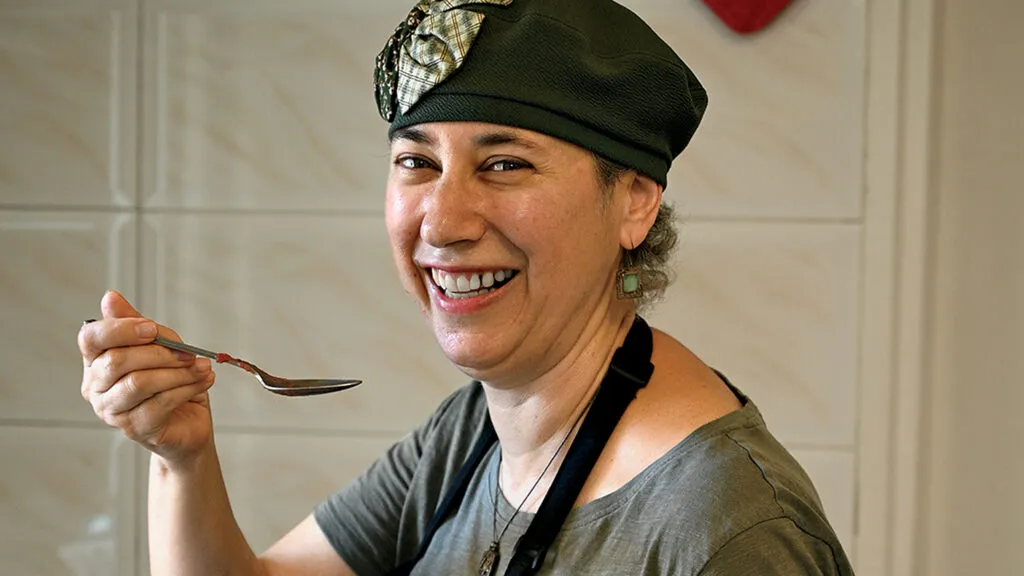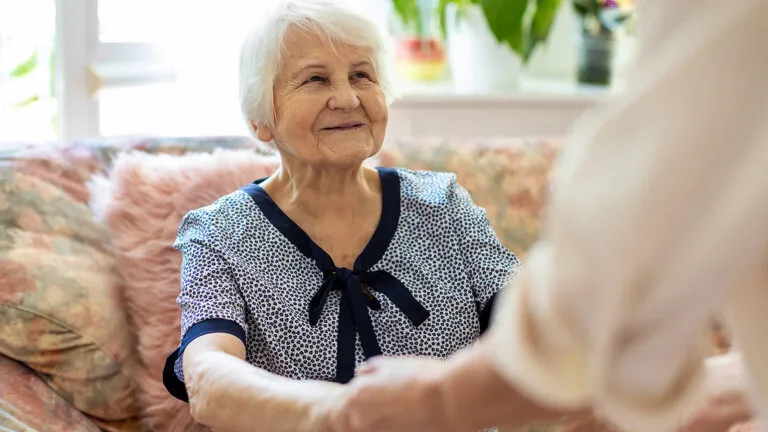If there was a way to capture the essence of my mom, Naomi, it was through her cooking. My childhood was filled with bountiful family dinners, especially on Friday nights, when we celebrated Shabbat, and mouthwatering holiday feasts. The kitchen was Mom’s domain, the same way the lab was my scientist dad’s.
Both had grown up in the rough East End of London. My dad, Jack, had been as skinny as a rake. Mom’s cooking soon fattened him up.
My brother and I were born in England. We were toddlers when our family moved to the U.S. for Daddy’s career. We had a typical American childhood in Bethesda, Maryland. We went to the local synagogue, where Mom eventually became executive director. In our house, the kitchen was the best place to be. We each had our assigned seats around the butcher block table in the breakfast nook. I would sit for hours in my heavy oak chair, reading all manner of books. The radio was tuned to rock or classical, depending on who got to it first. And Mom was always there by the counter, cutting, chopping, stirring.
Mom’s chicken soup was her expression of love for our family. She cooked this dish with only fresh herbs (don’t even think of using dried herbs!) and vegetables cut into big chunks. We delighted in the clear golden broth, the tender strands of chicken, the soft celery and aromatic dill. It was the highlight of every Shabbat dinner.
I moved to Israel with my husband in 1991. Jeff and I made our home in Beer Sheva, in the Negev desert. My parents soon moved to Israel as well, to the Mediterranean resort city of Netanya. Jeff and I traveled with our kids to Netanya to share Shabbat with my parents. We’d walk together along the beach, then feast on one of Mom’s amazing Shabbat dinners—roasted meat and eggplant, hummus, challah, plum pie and, of course, chicken soup. The kids always asked for seconds, sometimes even thirds, of the fragrant dish.
In 2010, at the age of 69, Mom was diagnosed with Alzheimer’s. She remained bubbly, talkative and good-natured. She could make jokes and sing along to her favorite songs. But she could no longer manage cooking those tremendous meals. A huge part of her identity—the nurturing mother and wife who gave love through her cooking—was lost.
For the first time in his life, Daddy started cooking. We joked that he had found his true passion. He brought his scientific expertise into the kitchen.
Every Tuesday, I’d make the two-and-a-half-hour trip to Netanya. Mom and I would roam the bustling streets, window shopping and telling jokes. We’d drink coffee at a café with a view of the sea. I tried to keep our outings stress-free. If that meant bending the truth to fit Mom’s reality, that’s what I did. Sometimes she informed me she was 46, which made me older than she was. I’d just go along with it.
I knew the longer I could keep Mom active and involved, the longer we would have her around with us. I took her grocery shopping and had her help me choose ingredients, even if she mixed up tomatoes and red peppers. When we made soup, I’d help Mom cut vegetables so she could still take part in cooking.
Sometimes she wanted to be held. The first time she came into my arms, I felt awkward. I comforted her, but I knew that what I wanted—to remain her child—could not last. Even the Jewish grace after meals became problematic. Sitting at my parents’ table, I recited, “God of compassion, bless my father and my mother, my teachers, hosts of this household.” I felt sad saying the words. Mom had taught me many things over the years, some practical (how to check eggs before you buy a carton), others intangible (that children thrive when you love them unconditionally). Was she still my teacher?
As a way to cope, I stationed myself in my kitchen and focused on cooking, incorporating recipes from Mom and borrowing from the cultures around me. Mom gave me all her cookbooks, and I studied the notes she’d made in them. I found her handwritten recipe for sesame green beans taped inside Florence Greenberg’s Jewish Cookery Book and added it to my repertoire.
My kitchen experiments brought back memories that turned out to hold new significance—for instance, my favorite cake Mom used to make when my brother and I were kids. Failure cakes, we called them. I don’t recall why she let us eat the first one. Had she left out an ingredient? Misjudged the baking time? The batter rose to a rich, wine-sweetened cake with a hint of nutmeg. Delicious! We begged Mom to make more. She did, just for us. The flaw turned out to be what made the cake special. Failure cakes are an apt metaphor for Alzheimer’s. I try to find a success within the limitations the disease has put on her life. Take my Tuesdays with Mom—it didn’t matter how many times we drank coffee in the same café or window-shopped at the same stores. What mattered was that we were together. Each visit was new for her, and I loved those moments of joy and laughter as much as she did.
Then there were the meals that Mom used to patch together from leftovers—they were legendary in our house. She’d bring to the table a pan brimming with chicken or beef cut into small pieces and sautéed with as many vegetables as would fit. Onions, peppers, maybe green beans and cauliflower. She’d add soy sauce, tomato paste or leftover gravy to create a delectable sauce. I can’t say there hasn’t been grumbling from my kids when dinner appears on the table as a reinvented version of yesterday’s fare. But as when I was growing up, every time we make Mom’s Leftovers Supreme, it turns out different and delicious. It’s all in the quality of what you’ve got to put in it. And the amount of love you add. Sort of like our lives. Even as Alzheimer’s claims more of her abilities, Mom is still teaching me.
For more inspiring stories, subscribe to Guideposts magazine.






